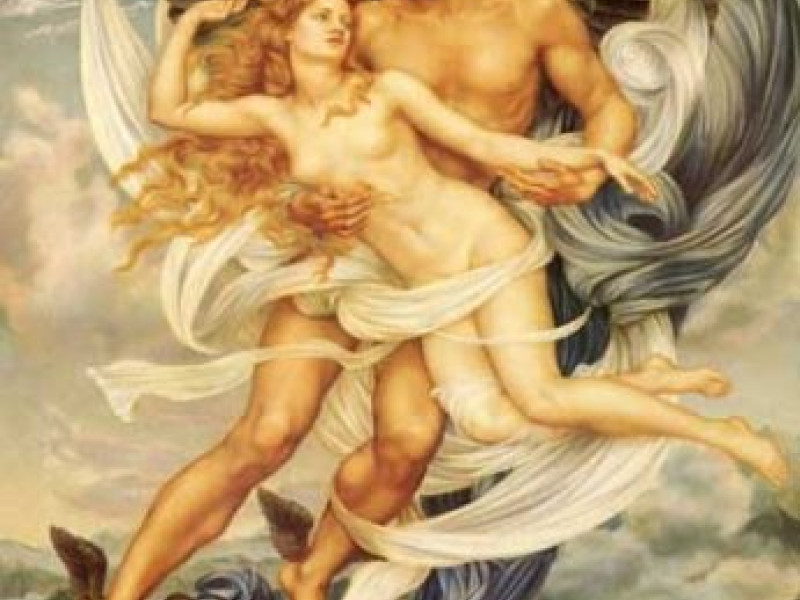Early Kings of Athens
Cecrops I
There is some confusion over who the earliest rulers of Athens were. Attica was probably originally called Acte or Actaea after its first king, Actaeüs (Actaeus). Cecrops married Actaeus' daughter Agraulus. Without a son of his own, Actaeus was succeeded by Cecrops, who renamed the region from Acte (Attica) to Cecropia. Sometimes Classical writers thought that Cecrops was the first king of Attica.
Cecrops was said to have been an earth-born creature, half-man half-serpent. He had the legs and tail of a serpent. Cecrops and Agraulus had three daughters named Pandrosus, Agraulus II and Herse. Cecrops also had a son named Erysichthon, but he probably outlived his son, because Cranaüs (Cranaus) succeeded Cecrops. Some even said that Cecrops was the founder of the city of Athens, but this honour was usually given to his successor.
It was during his reign in Cecropia (Attica) that Poseidon and Athena contested for the patronage of Attica or Athens. Poseidon showed his power by striking a boulder at the Acropolis with his trident, causing sea water to gush out of the rock. Athena, on the other hand, caused an olive tree to grow out of rocky soil. Cecrops and the people thought that an olive tree was more useful than a salt-water well, so they awarded the city to the goddess and named the city after her – Athens. Poseidon was enraged with the decision and flooded Attica.
Erichthonius
It was also during Cecrops' reign that Hephaestus the smith-god tried to ravish Athena, the virgin war-goddess. Athena fought Hephaestus off, causing the god's semen to fall on the earth at the Acropolis. Hephaestus' semen impregnated Gaea (Earth), causing an earth-born creature to be born; an infant with the legs and tail of a serpent. (According to Apollodorus, Erichthonius was the son of Hephaestus and Atthis, daughter of Cranaüs, but Apollodorus also included the possibly that Athena might be Erichthonius' real mother.)
Athena took the infant and named him Erichthonius. The goddess placed the infant in a chest. She gave the chest to Pandrosus, Herse and Agraulus II, warning Cecrops' daughters not to open the chest. Curious to what was hidden within the box, Herse and Agraulus opened the chest.
Either Athena inflicted them with madness for disobedience to her order, or the horror of seeing Erichthonius drove them mad. Whichever the case was; they threw themselves off of a cliff and died. (According to Ovid, they did not die, because Herse became the mother of Cephalus by Hermes, while Agraulus was seduced by Ares and bore a daughter named Alcippe.)
Cecrops' successor Cranaüs renamed the Cecropia to Attica, in honour of his daughter Atthis, who died as a young girl. Cranaüs had two other daughters named Cranae and Cranaichme by his Spartan wife, Pedias. Cranaüs lived at the time of the Deluge. Cranaüs was probably the founder and the first ruler of Athens, before Amphictyon, Cranae's husband, deposed him.
Amphictyon was the son of Deucalion and Pyrrha (see Deluge). Amphictyon married Cranae and deposed his father-in-law from the throne of Athens. Amphictyon was in turn deposed by Erichthonius after only twelve years' reign.
Erichthonius established the Panathenaic festival in honour of Athena, his foster-mother. Erichthonius also erected a wooden image of Athena. Erichthonius married a nymph named Praxithea and became the father of Pandion (Pandion I).
Related Information
Name
Cecrops, Κέρκωψ.
Erichthonius, Ἐριχθόνιος.
Sources
The Library was written by Apollodorus.
The Description of Greece was written by Pausanias.
Metamorphoses was written by Ovid.
Contents
Related Articles
Deucalion, Pyrrha.
Athena, Poseidon, Hephaestus, Gaea, Hermes, Ares.
Deluge.
Attica and Attica in Geographia.
Genealogy: House of Athens.
By Jimmy Joe



